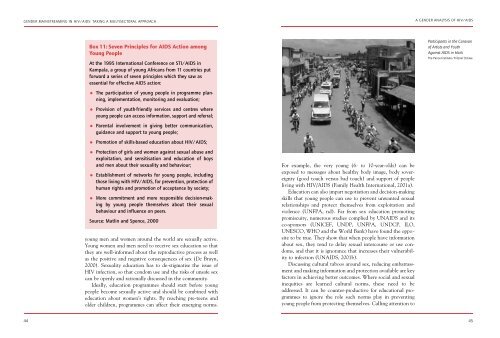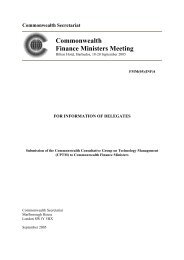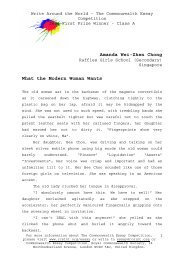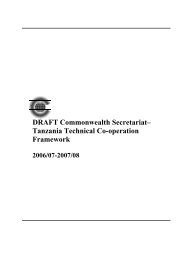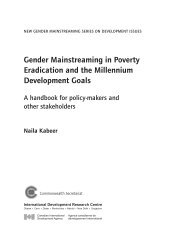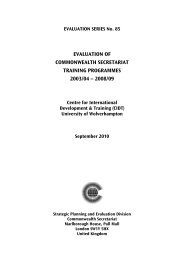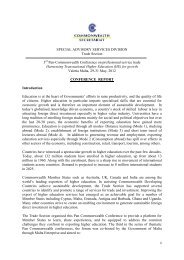Gender Mainstreaming in HIV/AIDS - Commonwealth Secretariat
Gender Mainstreaming in HIV/AIDS - Commonwealth Secretariat
Gender Mainstreaming in HIV/AIDS - Commonwealth Secretariat
You also want an ePaper? Increase the reach of your titles
YUMPU automatically turns print PDFs into web optimized ePapers that Google loves.
GENDER MAINST R E A M I NG IN <strong>HIV</strong>/<strong>AIDS</strong>: TA K I NG A MULT I S E C TORAL APPROACH<br />
Box 11: Seven Pr<strong>in</strong>ciples for <strong>AIDS</strong> Action among<br />
Young People<br />
•<br />
•<br />
•<br />
•<br />
•<br />
•<br />
•<br />
Source:<br />
young men and women around the world are sexually active.<br />
Young women and men need to receive sex education so that<br />
they are well-<strong>in</strong>formed about the reproductive process as well<br />
as the positive and negative consequences of sex (De Bruyn,<br />
2000). Sexuality education has to de-stigmatise the issue of<br />
<strong>HIV</strong> <strong>in</strong>fection, so that condom use and the risks of unsafe sex<br />
can be openly and rationally discussed <strong>in</strong> the community.<br />
Ideally, education programmes should start before young<br />
people become sexually active and should be comb<strong>in</strong>ed with<br />
education about women’s rights. By reach<strong>in</strong>g pre-teens and<br />
older children, programmes can affect their emerg<strong>in</strong>g norms.<br />
For example, the very young (6- to 10-year-olds) can be<br />
exposed to messages about healthy body image, body sovereignty<br />
(good touch versus bad touch) and support of people<br />
liv<strong>in</strong>g with <strong>HIV</strong>/<strong>AIDS</strong> (Family Health International, 2001a).<br />
Education can also impart negotiation and decision-mak<strong>in</strong>g<br />
skills that young people can use to prevent unwanted sexual<br />
relationships and protect themselves from exploitation and<br />
violence (UNFPA, nd). Far from sex education promot<strong>in</strong>g<br />
promiscuity, numerous studies complied by UN<strong>AIDS</strong> and its<br />
co-sponsors (UNICEF, UNDP, UNFPA, UNDCP, ILO,<br />
UNESCO, WHO and the World Bank) have found the opposite<br />
to be true. They show that when people have <strong>in</strong>formation<br />
about sex, they tend to delay sexual <strong>in</strong>tercourse or use condoms,<br />
and that it is ignorance that <strong>in</strong>creases their vulnerability<br />
to <strong>in</strong>fection (UN<strong>AIDS</strong>, 2001b).<br />
Discuss<strong>in</strong>g cultural taboos around sex, reduc<strong>in</strong>g embarrassment<br />
and mak<strong>in</strong>g <strong>in</strong>formation and protection available are key<br />
factors <strong>in</strong> achiev<strong>in</strong>g better outcomes. Where social and sexual<br />
<strong>in</strong>equities are learned cultural norms, these need to be<br />
addressed. It can be counter-productive for educational programmes<br />
to ignore the role such norms play <strong>in</strong> prevent<strong>in</strong>g<br />
young people from protect<strong>in</strong>g themselves. Call<strong>in</strong>g attention to<br />
A GENDER ANA LYSIS OF <strong>HIV</strong>/<strong>AIDS</strong><br />
Participants <strong>in</strong> the Caravan<br />
of Artists and Youth<br />
Aga<strong>in</strong>st <strong>AIDS</strong> <strong>in</strong> Haiti.<br />
The Panos Institute/Fritznel Octave<br />
44 45


